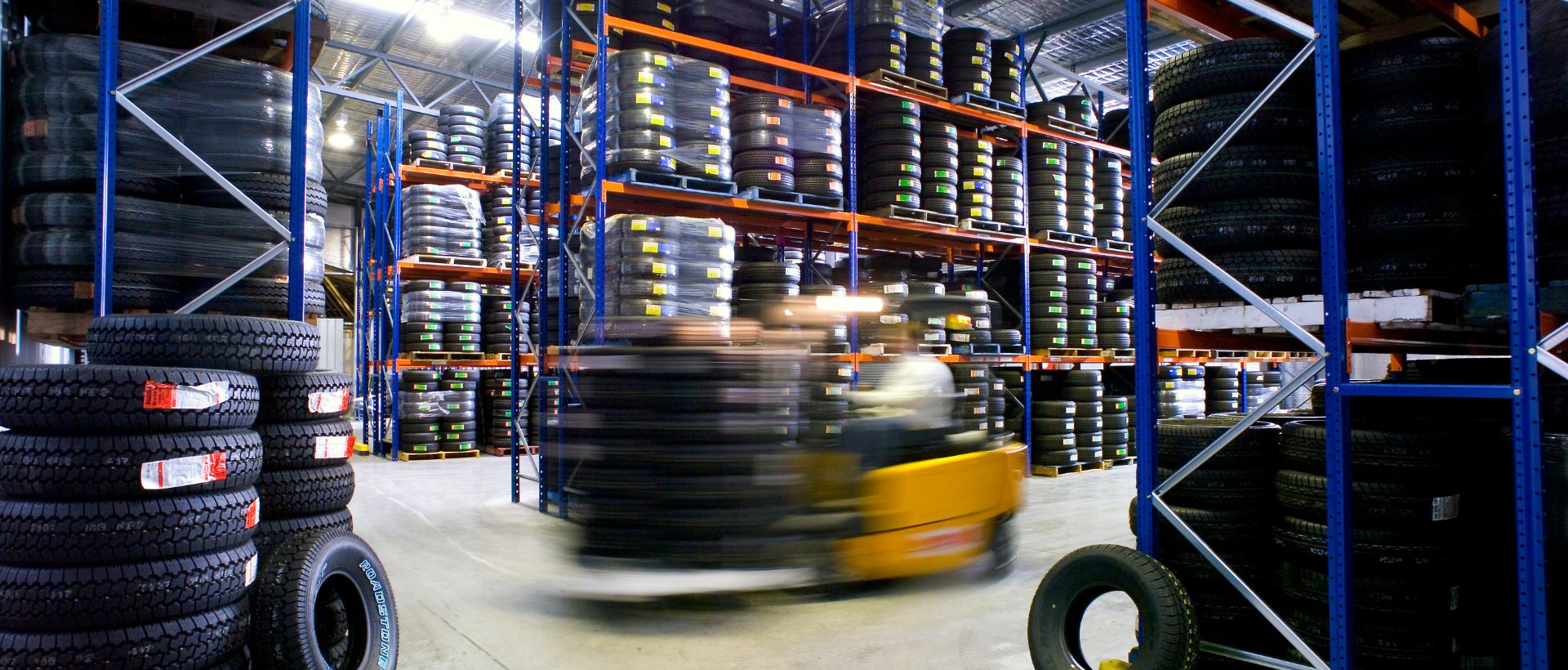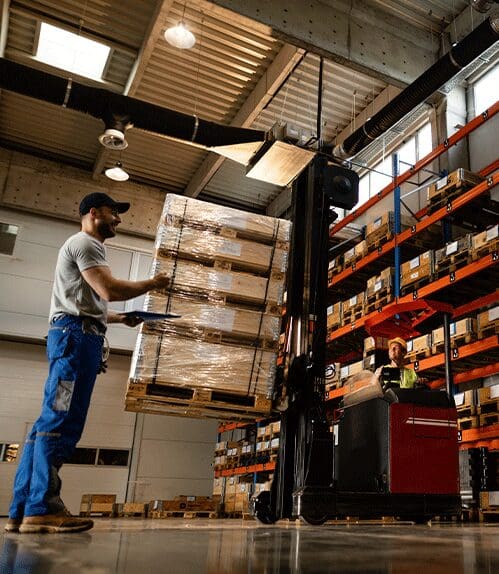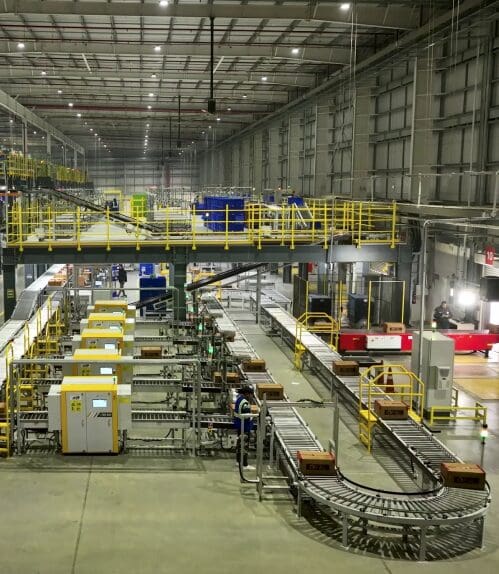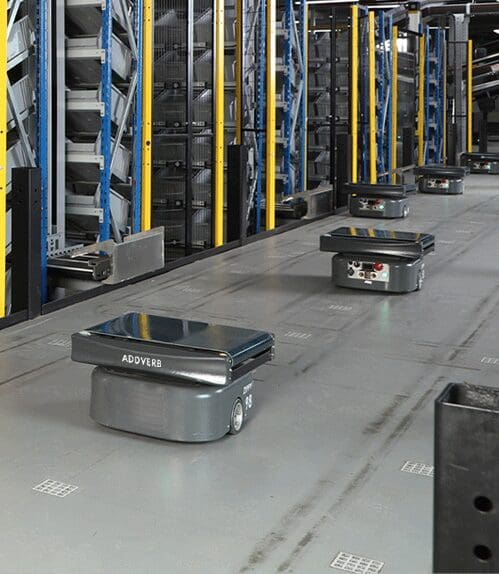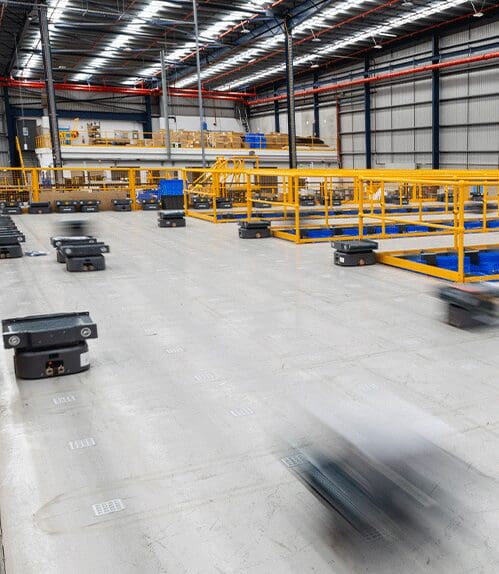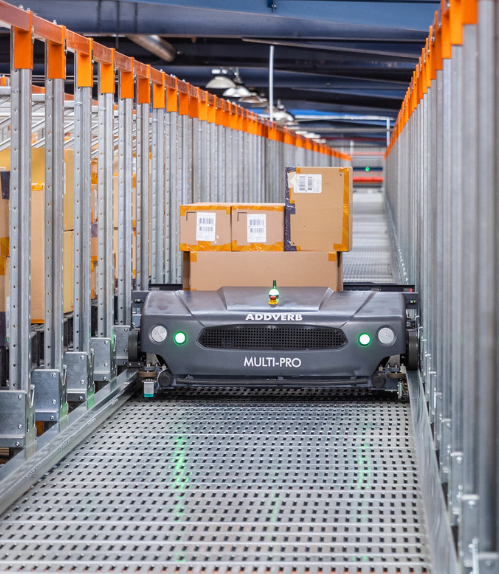목차
자동차 및 타이어 창고는 인건비 상승, 공간 제약, 증가하는 재고 수요를 어떻게 극복할 수 있을까요? 그 해답은 바로 자동화에 있습니다.
모바일 로봇, 분류 로봇, 자동화된 보관 및 검색 시스템을 통해 창고는 공간을 최대화하고 주문 이행을 간소화하며 더 많은 물량을 더 효율적으로 처리할 수 있습니다.
이러한 스마트 솔루션은 기업이 급변하는 시장에서 규모를 확장하고 오류를 줄이며 경쟁력을 유지할 수 있도록 지원합니다.
2023년 전 세계 자동차 및 타이어 창고의 규모는 1,373억 3,000만 달러로 평가되었습니다. 이 시장은 2024년에 1,438.8억 달러로 성장할 것으로 예상되며 2024년부터 2034년까지 4.91%의 연평균 성장률(CAGR)로 2034년에는 약 2,328억 달러에 달할 것으로 전망됩니다.
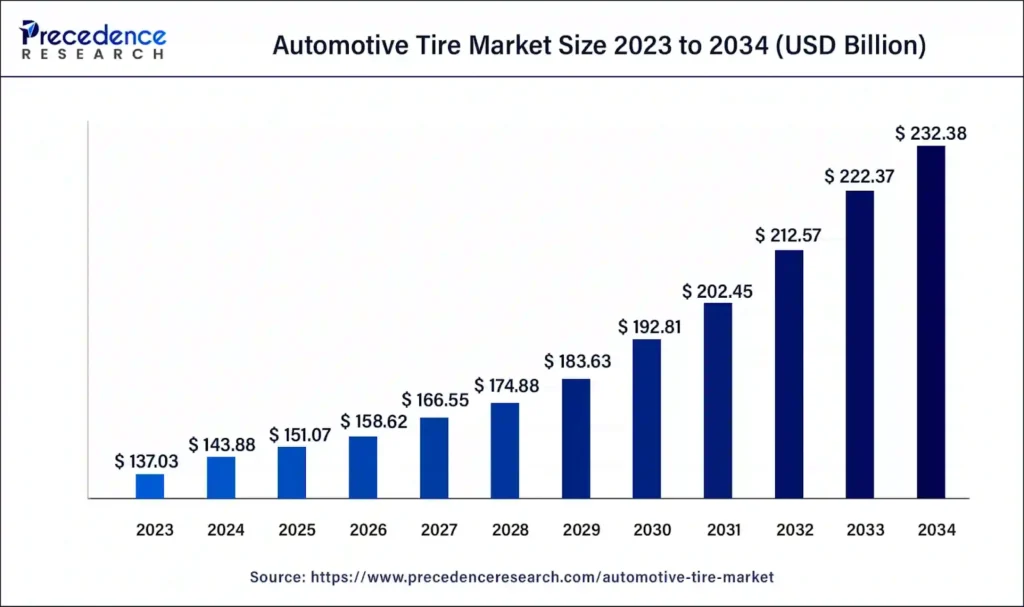
자동차 및 예비 부품의 일반적인 창고 요구 사항
- 자재 이동: 자재 이동은 다운타임을 최소화하고 처리량을 극대화하는 데 매우 중요합니다. 자재 이동에는 컨베이어 벨트, 지게차, 모바일 로봇 또는 자동화된 시스템을 통해 입고 구역에서 창고로, 그리고 배송 구역으로 부품을 빠르고 정확하게 운반하는 것이 포함됩니다.
- 보관: 말할 필요도 없이 자동차 부품을 보관하려면 선반부터 특수 랙과 쓰레기통에 이르기까지 다양한 디자인의 장비가 필요합니다. 접근성, 크기, 무게, 검색 빈도 등을 항상 고려해야 하므로 공간별 활용도 최적화는 필수 사양이지만 제한 사항은 아닙니다.
- 분류: 부품분류는 피킹 및 배송을 용이하게 하기 위해 부품을 유형, 크기 또는 주문에 따라 그룹화하는 작업입니다. 이는 바코드 스캐닝 및 RFID 시스템을 통해 자동화 또는 부분 자동화 시스템에서 이루어지므로 빠르고 정확하며 효율적입니다.
자동차 및 타이어 창고를 위한 자동화 솔루션
자재 이동 솔루션: 모바일 로봇
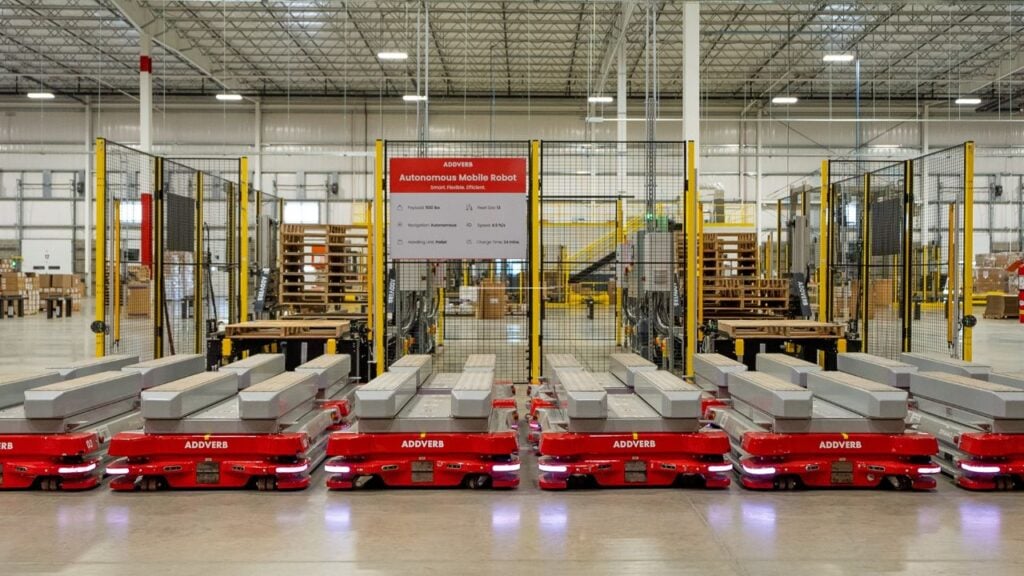
Dynamo 는 자동차 및 타이어 창고에서 자재 취급의 효율성, 안전성, 생산성을 높이는 데 중요한 역할을 하는 새로운 시대의 모바일 로봇입니다.
이 로봇은 다양한 자동차 부품과 예비 부품을 운반하여 목적지까지 배송하는 복잡한 창고 레이아웃을 무인으로 탐색하는 데 사용됩니다.
기존에는 수작업으로 진행되던 작업을 자동화하여 재고 검색, 주문 처리, 상품 운송에 소요되는 시간을 단축합니다.
이를 통해 위험한 환경에 대한 직접적인 인체 노출을 줄이고 처리량도 향상시킵니다. 또한 극한의 냉장 보관에서도 작동할 수 있어 온도에 민감한 부품을 안전하게 관리할 수 있습니다.
데이터를 실시간으로 추적하면 재고 관리에서 오류가 발생할 가능성이 적은 흐름을 개발하는 데 도움이 됩니다.
스토리지 솔루션: 자동화된 저장 및 검색 시스템(ASRS)
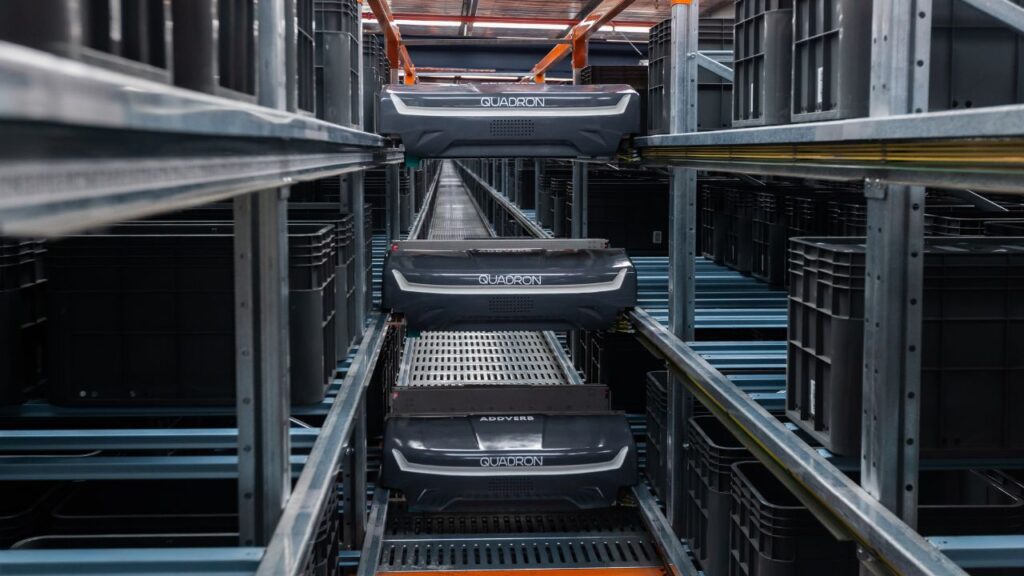
AS/RS: 상품의 고밀도 보관 및 검색을 위해 설계된 혁신적인 창고 자동화 기술. 레일, 로봇 팔, 셔틀, 리프트, 재고 관리 및 신속한 자재 취급 프로세스를 위한 소프트웨어가 장착되어 있습니다.
스태커 crane: 무거운 물품을 효율적으로 적재하고 하역하여 정확한 보관을 보장합니다. 단위 적재와 팔레트 적재를 위해 고도로 설계되었으며 정확한 실시간 재고 추적이 가능합니다.
수직 분류 로봇: 전용 트랙에서 다양한 높이로 개별 패킷을 목적지 위치로 분류하면서 매우 정확한 분류 작업을 수행합니다.
분류 로봇
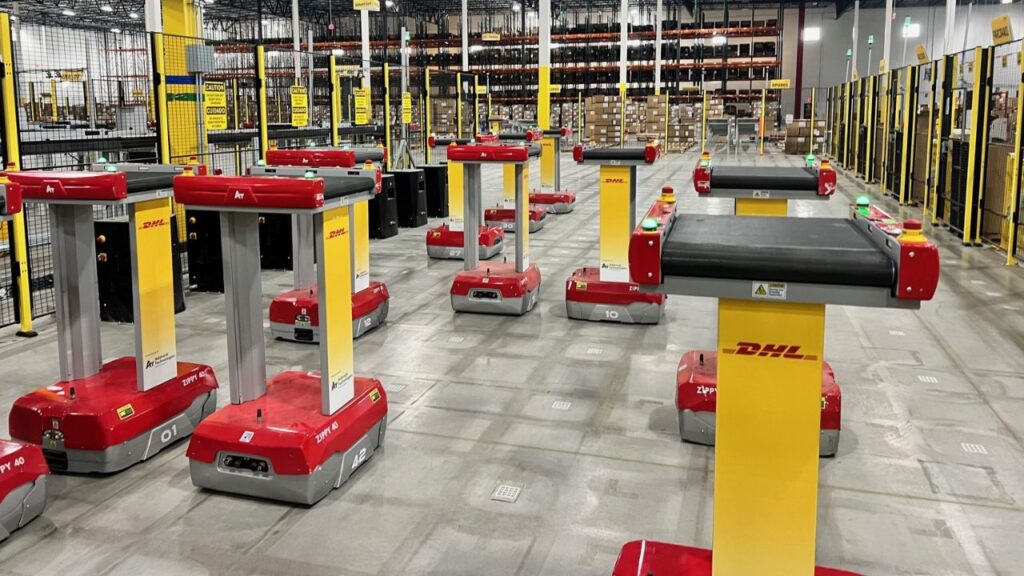
자동차 및 타이어 창고에서 분류 및 제품 취급의 효율성 향상은 다음과 같습니다. Zippy 와 SortIE. Zippy 자동차 부품과 타이어를 매우 빠른 속도로 분류하며, 수직 또는 플로어 탑 등 모든 창고 시스템에 맞게 조정할 수 있습니다.
장애물 감지 기능으로 좁은 공간에서도 충돌 위험이 적은 안전한 내비게이션을 제공합니다.
벨트 구동 메커니즘을 갖춘 SortIE 매우 많은 양의 타이어와 부품을 효과적으로 관리할 수 있으며, 필요에 따라 쉽게 확장할 수 있는 규모를 제공합니다.
이 로봇은 분류 프로세스를 구현하여 수작업을 줄이고 오류를 최소화함으로써 창고 운영과 프로젝트 재고 관리를 최적화하고 있습니다.
자동화를 통해 자동차 물류창고 문제를 해결하는 방법
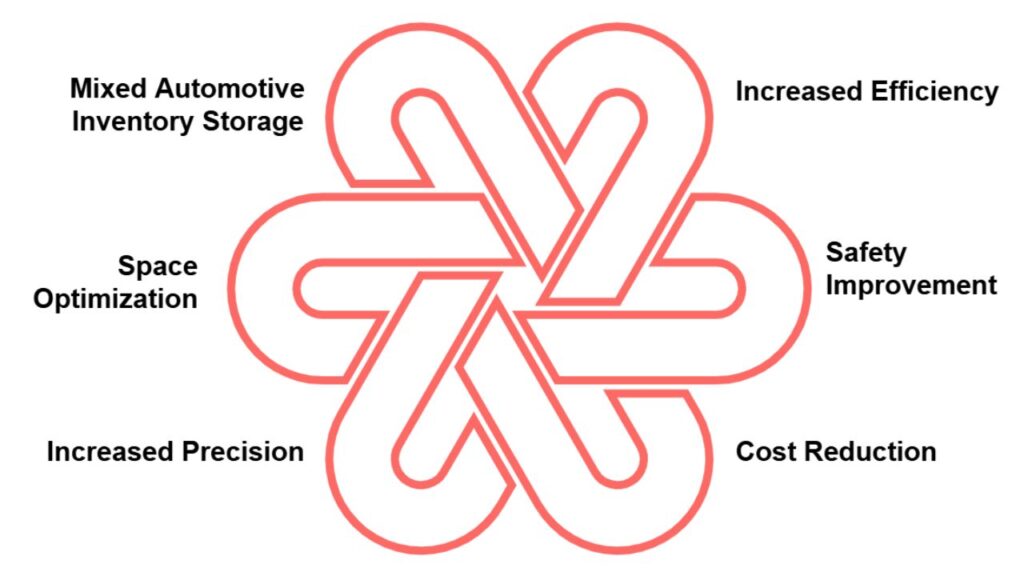
- 효율성 향상: 주문 처리, 재고 관리, 자재 취급과 같은 다른 프로세스의 속도를 높일 수 있습니다.
- 안전 개선: 안전하지 않은 작업 조건에서 수작업이 줄어들면 작업자의 안전이 향상됩니다.
- 비용 절감: 노동력 감소, 오류 감소, 최적의 리소스로 운영 비용 절감.
- 정확성 향상: 오류 감소로 재고 정확도 및 주문 피킹이 향상되고 고객 만족도가 높아집니다.
- 공간 최적화: 더 큰 스토리지 용량을 설치하고 사용 가능한 공간을 효율적으로 사용하여 창고 공간을 극대화합니다.
- 혼합 자동차 재고 보관: AGV, ACR, AMR과 같은 로봇은 최대 10~12미터 높이에서 물품을 보관하고 검색할 수 있어 고밀도 보관이 가능합니다.
이러한 유연성을 통해 공간 확장에 대한 최소한의 요구 사항으로 수요의 피크와 밸런스를 수용하면서 증가하는 SKU 볼륨에 맞게 시설을 조정할 수 있으므로 운영이 간소화되고 가용 공간을 더 잘 활용할 수 있습니다.
결론
우리는 자동차 및 타이어 창고에서 자동화를 통해 노동력 부족, 안전 위험, 공간 불균형 등 많은 문제를 해결해 왔습니다.
AGV, AMR, ASRS, 분류 로봇과 같은 자동화 솔루션은 공간에서 비용을 절감하고 오류를 줄이면서 효율성과 정확성을 높일 수 있는 가능성을 창출합니다.
이러한 혁신을 통해 조직은 대규모 인프라를 변경하지 않고도 향후 증가하는 수요에 더욱 신속하게 대응하는 방식으로 운영을 확장할 수 있습니다.
물류창고 운영을 최적화할 준비가 되셨나요? 물류창고를 자동화하고 비즈니스의 효율성과 성장을 촉진할 수 있는 솔루션에 대해 지금 바로 문의하세요.

자주 묻는 질문
자동차 및 타이어 창고업의 주요 과제는 무엇인가요?
높은 재고 회전율, 공간 최적화, 빠르고 정확한 주문 처리 등의 과제를 해결해야 합니다.
자동화는 자동차 및 타이어 창고업에 어떻게 도움이 될까요?
로봇 분류기 및 ASRS와 같은 자동화는 효율성을 개선하고 수작업을 줄이며 공간을 최적화합니다.
자동차 및 타이어 창고에 이상적인 자동화 솔루션은 무엇일까요?
AGV, 컨베이어, 로봇 분류기는 대량의 물량을 처리하고 처리량을 개선하는 데 핵심적인 역할을 합니다.
자동차 및 타이어 창고에서 자동화를 통해 얻을 수 있는 이점은 무엇일까요?
효율성 향상, 리드 타임 단축, 주문 정확도 향상, 비용 절감 등의 이점이 있습니다.
